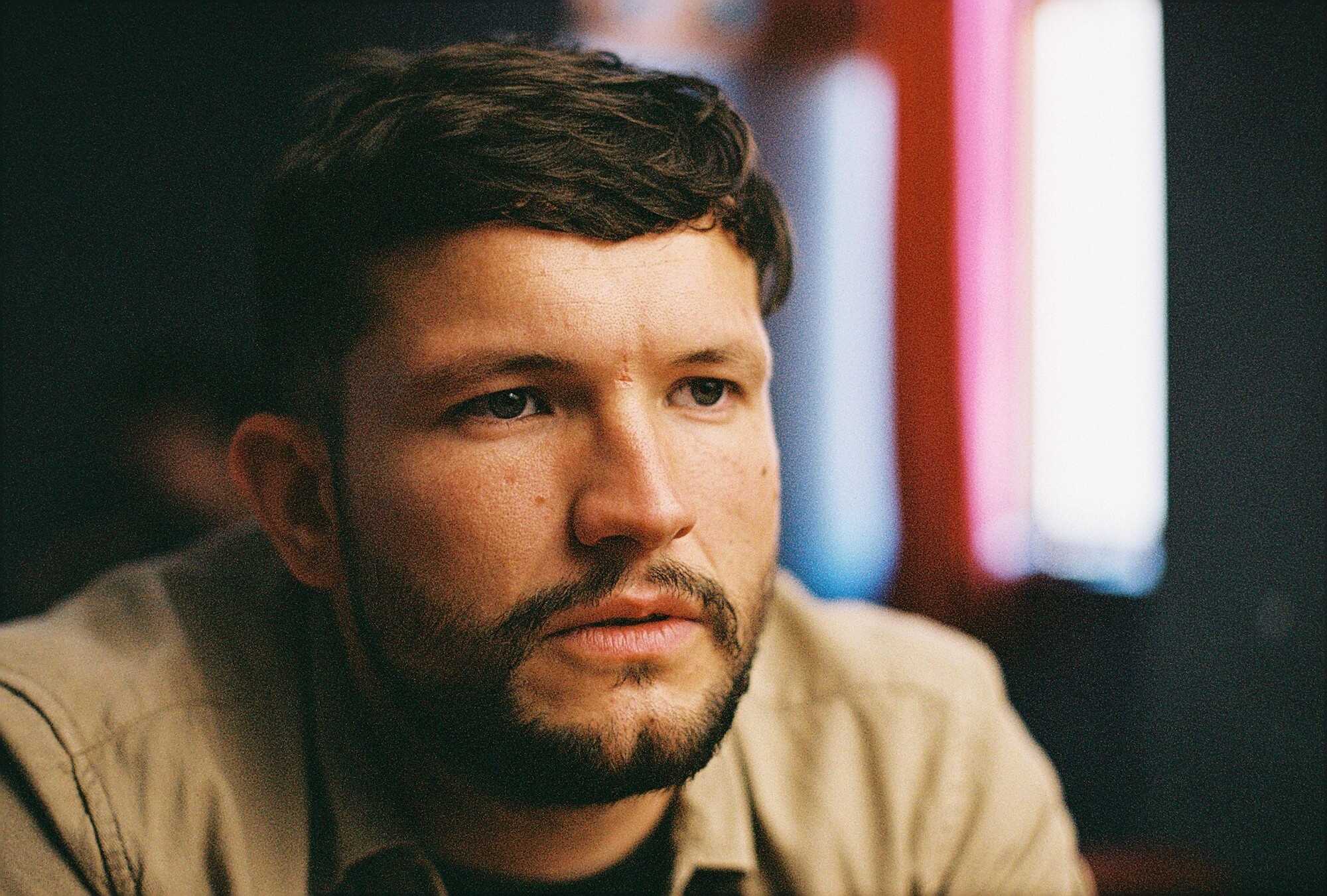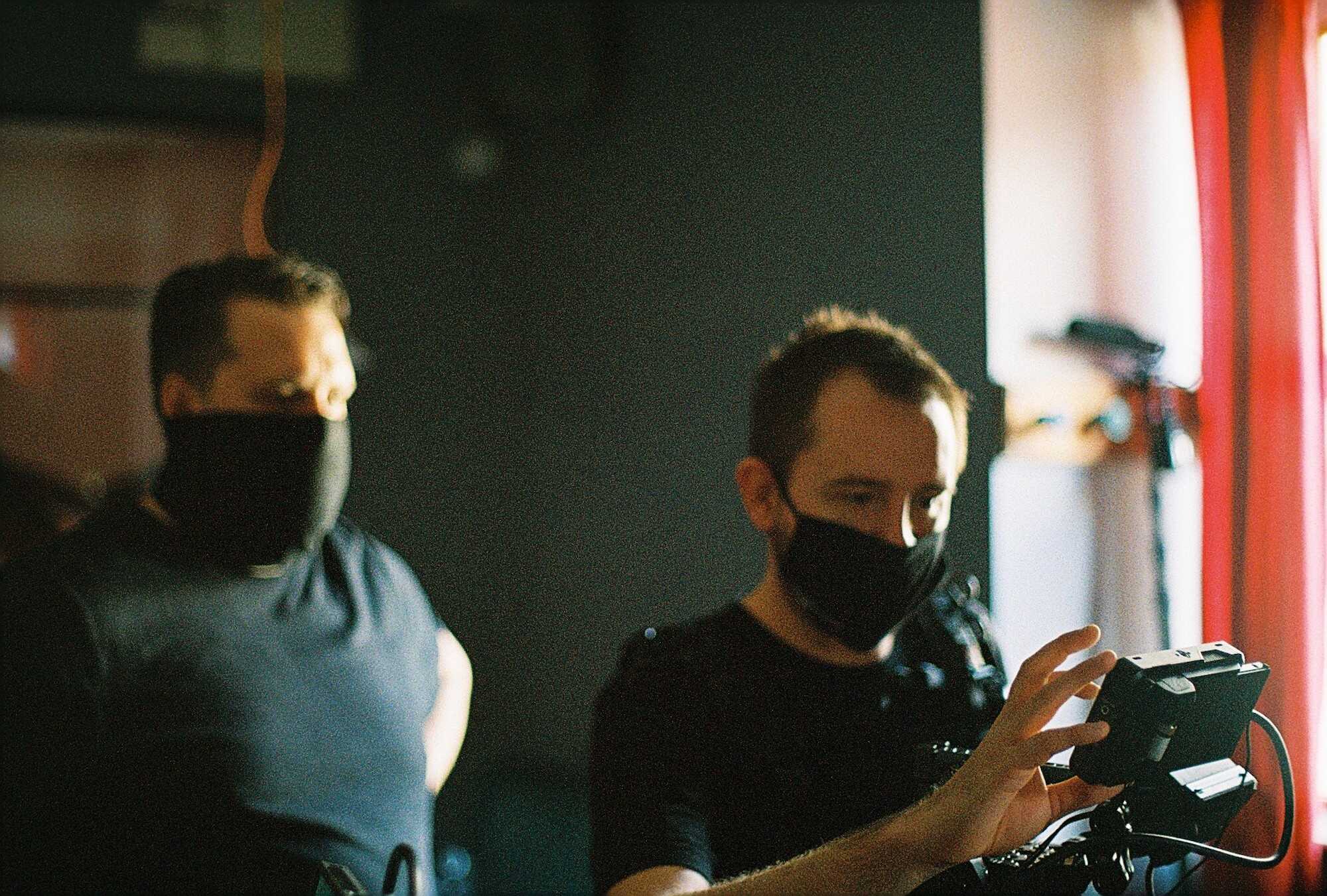
In a café in Marseille, a man’s life is suddenly knocked off its axis when his lunch is disturbed by a chatty stranger. Falsetooth Films’ Liam White and Larry Ketang’s latest short Punch-Drunk is a masterfully suspenseful near one-shot thriller about a man whose history finally catches up to him. It’s a film that’s deceptively simple in its construction; one location, one conversation, and almost one-shot but it’s that very combination that makes it such a compelling watch. Both Barry Ward, of Jimmy’s Hall fame, and Corin Silva turn in intricately nuanced performances that draw you into the pair’s captivating meeting and the eerily still accompanying camerawork allows you to focus in and meditate on their words. DN joined Co-Director Liam White for a conversation about Punch-Drunk where he reveals the creative frustrations that the film was born out of, the raft of challenges a near single-shot film faces when it comes to production, and his festival strategy for pandemic-created work.
Punch-Drunk is one of those short films you just can’t take your eyes off. How did it come about?
Punch-Drunk was born out of frustration. My Co-Director Larry Ketang and I had been making sketches and short films for a few years, and then Tick Tick Tick was the first script I wrote that felt like a ‘proper’ short film. It took six years to make, which is far too long for any film, never mind a short film. Problem was when we set out to make it, we didn’t know any DoPs, any sound recordists, or anyone who did filmmaking. We had no money. No clue. About four years into the six year process, I watched a short film that was essentially an old woman doing an unbroken monologue. It was decent enough, but I sat there thinking, “that must have been a piece of piss to make”. I had four years of one film under my belt, and not really much to show for it. I decided I needed to write something that could be shot in a day, where the whole process would be six weeks, not six years.
I generally like to write scripts where you, the audience, are feeling what the character is feeling, emotion for emotion.
I decided it would be one fixed, almost unbroken take of a man, but I feel that monologues don’t generally feel believable so I thought, “OK, it’s gonna be a conversation, but we’re not gonna see the other guy. How would that make me feel?” I thought it would probably make me a bit uneasy, hearing someone off-screen but not being allowed to see them. I generally like to write scripts where you, the audience, are feeling what the character is feeling, emotion for emotion, so the genesis of the story was around that. I came up with and wrote the script within three days. Nice and easy. A one day shoot. But that was October 2018, we didn’t film it until August 2020!


That’s quite a jump in time. What challenges did you face in bringing the film together over that period?
One of the biggest problems was casting. I knew that when we finally cut to George, the actor portraying him had to instantly convey threat; that he could do you in if you got into a scrap. Imposing, but also ‘normal’, an everyday bloke. I trawled through what felt like every actor’s headshot in Britain, looking for an actor of just the right age and menace, but none quite gave me that vibe, I didn’t have a casting director, which probably would have made things much easier. There are loads of actors who could probably have delivered the script brilliantly but just didn’t have that aura of switching on a dime to beat seven shades of shit out of you.
Then after about a year I found Corin Silva on Instagram and slid into his DMs. Fortunately he loved the script and didn’t mind being off-screen for almost the entirety of the film. In fact, Punch-Drunk took so long to get the elements in place I wrote, shot and made Doughnut whilst things were ticking away, in which Corin also puts in an amazing performance as a troubled young man. Luckily too, Barry Ward’s agent took time off from chatting to the likes of Cillian Murphy and Hugh Jackman, and read my script. He’s such an incredible actor, beautifully nuanced in the way he moves through the stages of Colin’s emotional rollercoaster, and was also the perfect age for the role.
The aim was to make it as stifling and suffocating an experience as possible.
Whilst I was searching for actors, in September 2019 I put a message out to some Francophones living in Manchester asking if they wanted to have some native conversation recorded for my short film. Fortunately just enough turned up. I didn’t have any actors in place at that point, but I thought by doing that, committing the efforts of volunteers to tape, it would force the ball to get rolling.
Were you able to get Barry and Corin together before ether shoot to rehearse? I imagine that’s key given the film’s one-take nature.
We did a light rehearsal over Zoom around a week before, just to check their performances were in the right postcode. Then the night before, Barry, Corin and Larry came to my house where we went through the script and they could ask questions about the characters’ motivations, subtext, and background story not explicitly on the page to help guide where their respective character’s headspace would be at different stages of the script. Barry said that Ken Loach doesn’t like to rehearse too much, and to paraphrase Michael Shannon, likes to “leave the juice in the lemon”. Who was I to argue? Once they felt they had a good grasp of the world of the story, they drank all the beers in my house and ate my homemade pizza whilst watching the Champion’s League final. Given how well the film turned out, that might have to be my rehearsal process from now on!



Could you walk us through the day of the shoot? It must be a bit of a tightrope act watching your takes play out and hoping that nothing, small or large, ruins the flow.
On the day, we set the camera up on Barry as you see him, and he and Corin acted the scene out. There was just me, Larry, Gareth Bowler our DoP and focus puller, and Martyn Ellis our sound man extraordinaire on the crew. We ended up with around 16 takes of varying completion. This part was nerve-wracking after an earlier, amazing take was ruined about six minutes in when a car alarm went off. As a take would progress and you’d think “this is incredible”, there’d be a growing fear of it being ruined by a delivery driver storming in, etc. I knew that if we didn’t get a complete take the film wouldn’t exist, the one-shot is as integral to it as the dialogue, and so I simply wouldn’t release a shot/reverse shot version. Once we had what we thought were at least two solid options in the can, we wrapped and were in the pub across the road for half five.
I’ve spoken with directors in the past who have said that post on a one-shot short isn’t as easy as you’d think. How was it for you both?
Post-production wise, we toyed with tricks like making the sound fade out as he gets sucked into the conversation, but ultimately kept it light. The aim was to make it as stifling and suffocating an experience as possible. I thought the post process would be fast, not really any cuts like; just choose the best take. But it took ages. The script is carefully calibrated for the drip feed of information to be just the right pace for the walls to slowly close in, and to dialogue-wise sound as naturalistic as possible. We couldn’t choose the best delivery of each line and just had to go with which take was best overall. To do that meant sifting through the takes, then comparing some side by side. I reckon in that process alone I watched various takes of the film well over 40 times. But then you start forgetting which bits were in which take, 13 minutes is a long time! The take used I think is 14.
I knew that if we didn’t get a complete take the film wouldn’t exist, the one-shot is as integral to it as the dialogue.
You then went onto have a successful festival run with some BAFTA recognition. Did you have a specific approach to where you submitted the film?
I decided to focus on BAFTA and BIFA-qualifying festivals first, as the pandemic meant there was a lot of uncertainty about whether I could even attend, so I thought if I’m gonna spend money and it possibly be online I might as well aim high. The first screening was Raindance, and that was terrifying. Normally my films have a fair amount of humour in them, so you hear the audience laughing and know they’re enjoying it. Punch-Drunk played to what felt like a deathly silence. I had no idea what anyone’s take on it was. Then the credits rolled, and a fella in front, who I now know was fellow filmmaker Uzo Oleh, let out a long loud breath, like he’d been holding it in. The fella next to me said to his partner, “Jesus Christ that was tense!”. I felt a wave of relief.
It still hasn’t properly sunk in that it got longlisted for the BAFTA. I work in a special educational needs school for kids who often display quite severe and aggressive behaviour problems. Within minutes of me finding out, I had to go tell someone. I walked into my classroom and got punched in the head. Then covered with undiluted orange cordial. Showbiz. I can’t complain that it didn’t make the nomination stage: I’ve already had so many amazing messages from people about their experience of the film.


Given the tense atmosphere and near single-shot nature of the short, did you find that you approached making the film as if it was to be enjoyed fully on its first watch?
Ultimately I try to make things that are entertaining on the first watch, and make sense and add up if life is too short for you to re-watch something. But I try to stuff as many layers, hints and Easter eggs in there as possible that if you want to dig deeper, there’s stuff waiting down there for you. The hardest part of the script was making sure that George’s story did add up, but then equally, under close scrutiny, there’d be a little wriggle room to see how perhaps the perception of events had warped over time and between generations, how in some places massive assumptions were made. That was tricky. It had to be convincing and logical enough that Colin, and indeed us, don’t question it too much, at least not in the moment.
What’s next for Falsetooth films?
In terms of what’s next, we have both Pickles, which was funded by the BFI, that should be available later in the year, and Department of Necrosis, which is a fake 1970s Public Information Broadcast shot on film. We’ve also got a black comedy called Samurai Boulevard that we’re looking to shoot this summer, and I’m currently writing a feature with Barry Ward in mind. I’m also trying to develop some more long form ideas and move into filmmaking full time, agents/producers… get in touch!


